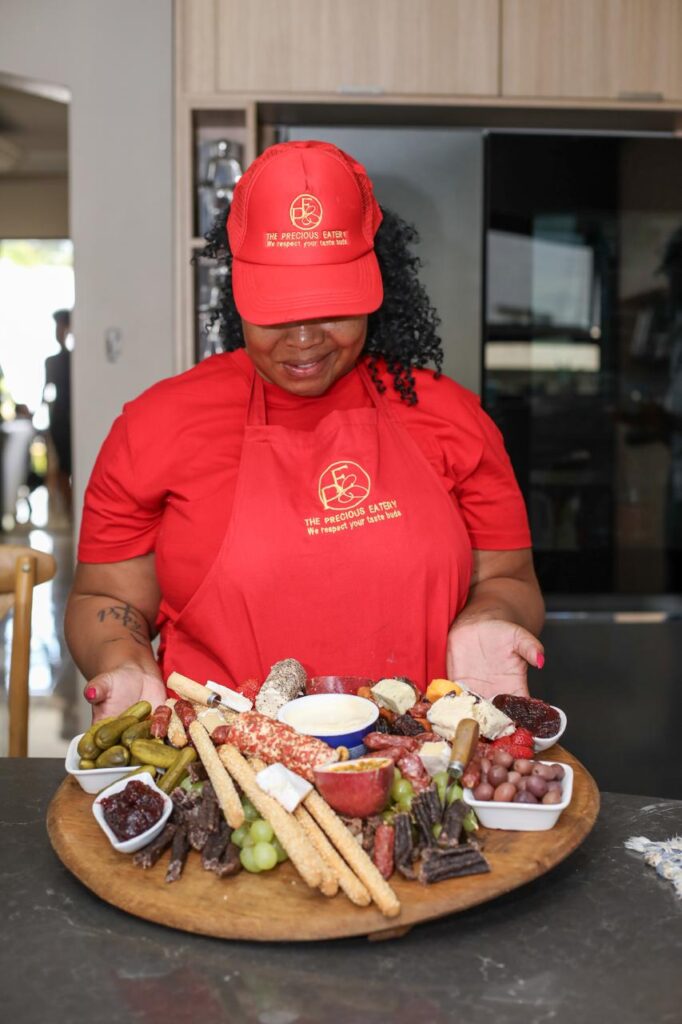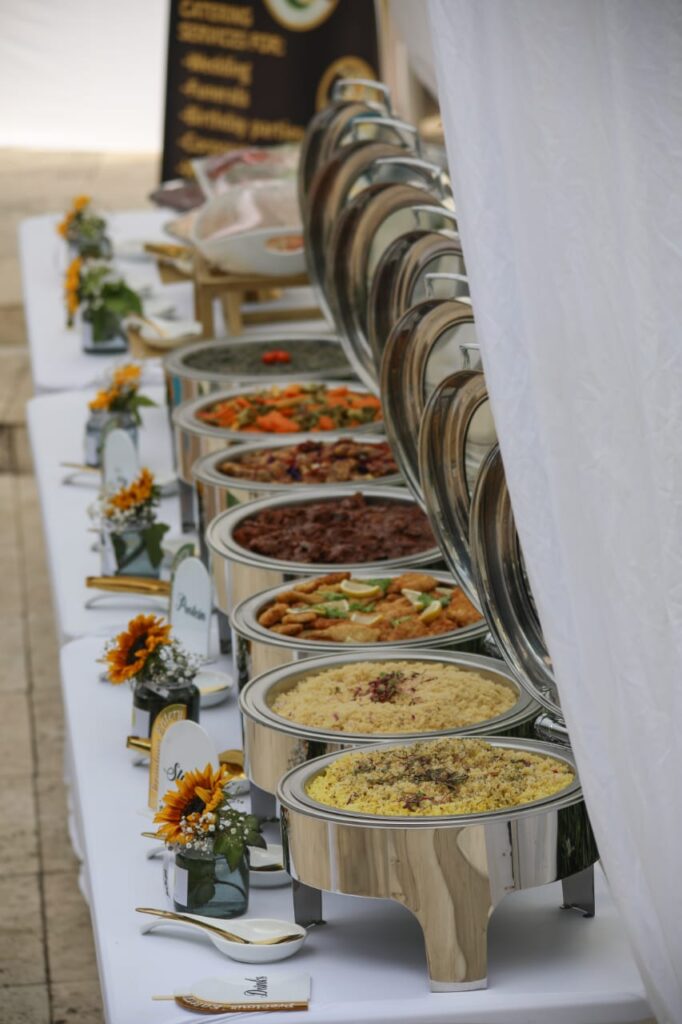Meet South African Food Entrepreneur Precious Nelisiwe Tleane (INTERVIEW)!

Meet South African Food Entrepreneur Precious Nelisiwe Tleane (INTERVIEW)! Precious Nelisiwe Tleane is a South African entrepreneur and self taught cook from Soweto. She is the founder and owner of The Precious Eatery, a catering company established in 2019. Precious is very passionate about food and the food industry as providing good delicious food brings her satisfaction. The Precious Eatery is well known for exceptional food, which still preserves the taste of a home made meal that Precious’ late mother instilled in her. We recently had a chat with Precious to discuss her entrepreneurship journey, the challenges that come with being in the catering business, women empowerment and much more. Check out the interview below!

What would you say was the biggest influence of you becoming passionate about food?
It all began in my late mother, Elizabeth Ngutshane’s kitchen. She was my biggest influence on being passionate about good, delicious food. Everyone knew that every weekend especially in winter they would never leave my mother’s house without a good meal, sitting around that old coal stove eating dumplings and soup or samp, she made the best samp OMG. My mother used to say, “Cooking gives you an opportunity to give someone else that oh my God, this is the best thing I’ve ever tasted”.
What made youu realise that you wanted to pursue building a business in the food industry?
During COVID since we were locked up, I started playing with different dishes to articulate my craft. I would post my dishes on social medial because that’s the only thing that connected us with the outside world, family, and friends. I then tracked the responses. Honestly there’s not a lot more gratifying than hearing that someone loves your presentation and wish to taste your meal one day. I’ve been very thankful to have a mother that loved to cook; my waistline may not be as thankful, but that is a different issue entirely.

Would you advice or encourage young people to take a career path in the food industry, considering South Africa’s current economic climate?
Yes! Employment opportunities are low in today’s climate. My advise if you want to venture in this industry is:
- Do your homework. Start with your family and friends. It’s essential to equip yourself with strategies and tips to make informed decisions, navigate challenges, to achieve goals.
- Explore the significance of personal branding, online presence, and networking in today’s competitive market.
- Continuously learn and upskill yourself.
- Sign up for those online programmes. Make internet your friend, its free. Use that smart phone to build your business. Don’t take negative comments as a draw back. Listen as this will build you and make you a fundi in your craft.
How has your experience as a female entrepreneur in the food/catering industry shaped you as a business leader?
Being an entrepreneur in the food and catering industry can be both challenging and rewarding. I have demonstrated resilience, creativity, and leadership in this venture. My experience highlights the importance of passion, innovation, and adaptability in the food industry.

With the set of skills, you have attained over the years, which skills helped you flourish as an entrepreneur?
- Leadership skills – You need excellent leadership skills to persuade people to share your vision, support it, and feel inspired to work towards the goal. You also need to expand your business over time as you grow.
- Communication skills – It’s essential if you want to sell your products to your target audience.
- Resourcefulness – You need to react quickly and find solutions in unplanned situations.
- Attention to detail – As an entrepreneur, you’re in constant contact with different people, including employees, and customers. You need active listening skills to take in constructive feedback or criticism. It’s not enough to know how to communicate effectively. Active listening skills are an important aspect of communication, and you must also be able to listen when people are communicating with you. With this skill, you can maintain good working relationships with everyone you come across.
- Time Management – There are a lot of important deadlines to meet in this business. You need solid time management skills to ensure you can meet those deadlines and deliver results. This is also important to develop, so you can learn to multitask effectively and get tasks done efficiently that contribute toward your larger goals.
- Networking – Keep in touch with people who can support you and boost your idea into a successful, realized business venture. An innovative idea, ambitious goal, and strong work ethic are vital for an entrepreneur. However, those elements are not enough on their own. You still need a community of people to encourage you, inspire you, and push your brand forward. There are a lot of tools you can use to help you build your professional network, including reaching out to successful business owners to learn from.
What would you say are some of the problems entrepreneurs encounter in the catering industry?
Load shedding! – Invest in gas, clients don’t want to hear excuses.
Capital – Equipment is expensive. Budget constraints, living wages, and rising food costs often place enormous strain on the budgets of catering businesses and it can be the smaller, independent businesses that suffer.
Specialised diets – There is a growing number of consumers who wish to know the provenance of food and whether the ingredients are local traceable as well as sustainable. Not only does this place pressure on the catering company from the point of view of budget, it can also mean that food and menus must be carefully and correctly labelled.
Have you ever tried to establish a business before The Precious Eatery or is this your first time being an entrepreneur?
No.

What are some of the long-term goals do you seek to achieve with your company?
- Increase sales
- Build brand recognition and brand awareness
- Consider strategies like social media marketing, community events, and partnerships to enhance brand visibility
- Improve customer satisfaction
- Expand client base
- Invest in quality equipment and staff
- Sustainable practices (This could involve sourcing local ingredients, minimizing food waste, and using eco-friendly packaging. Not only does this benefit the environment, but it also appeals to socially conscious clients).
- Adapt to industry Trends
- Financial Stability
What do you think the public and private sector should be focusing on to support black entrepreneurs?
- Easy access to funding
- Support and eliminating red tape
- Competitive processes to allow black entrepreneurs to offer their expertise in various areas.

What was the biggest obstacle in your entrepreneurship journey and how did you overcome it?
Taking the first leap – The timing is always better than you think. Figuring it out as you go is one of the most fun and rewarding parts of being an entrepreneur. Just do it.
Cash Flow – I was able to convince my prospective clients to pay a 70% deposit. This allowed me to purchase supplies and stock. I rented equipment from local catering businesses and negotiated costs.
Maintaining a budget – Prioritising efficient marketing strategies and allocating resources based on unique needs helped me to stay prepared for changes.
Lastly, persistence, adaptability and a willingness to learn are key traits for overcoming entrepreneurial challenges. Fear of failure should never deter you; instead, view it as an opportunity to learn and grow.
Please highlight why you think it is important to empower female entrepreneurs, especially if they come from disadvantaged backgrounds.
Female entrepreneurs contribute significantly to economic growth. When women are empowered to start and run businesses, they create jobs, stimulate local economies, and contribute to poverty reduction. By supporting female entrepreneurs, we can enhance overall economic prosperity.
Gender Equality and Representation: Despite progress, gender disparities persist in various sectors. Empowering female entrepreneurs helps bridge this gap by providing them with equal opportunities. When women lead businesses, they become role models, inspiring other women to pursue entrepreneurship and leadership roles.
Resilience and Adaptability: Women entrepreneurs often face unique challenges due to societal norms, discrimination, and limited access to resources. However, their resilience and adaptability are remarkable. By empowering them, we strengthen their ability to overcome obstacles and contribute to sustainable development.
Social Impact and Systemic Change: Women social entrepreneurs have a profound impact on their communities. They often challenge existing norms, address systemic inequalities, and create positive change. Their work goes beyond profit; it aims to improve lives and create a more just society.

For any inquiries you might have, you can reach the company on Facebook – The Precious Eatery





